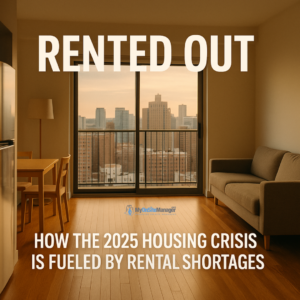The housing affordability debate has long centered around the cost of buying a home. But as 2025 unfolds, experts warn that the bigger storm may be brewing in the rental market. Soaring demand, lagging construction, and policy bottlenecks are pushing more households into competition for fewer available units and the consequences could ripple far beyond housing.
For millions of Americans, renting isn’t just a choice it’s the only option. High mortgage rates, stagnant wage growth, and limited housing supply have locked many out of homeownership, forcing them to remain renters longer than planned. This shift is creating a historic imbalance between supply and demand, driving rent prices higher and placing more households at financial risk.
Why Rentals Are Getting Scarcer and More Expensive
1. Lagging Construction Meets Growing Demand
New housing construction has slowed dramatically, particularly in the affordable rental sector. Developers face rising material costs, labor shortages, and lengthy approval processes. Even when projects break ground, they often lean toward luxury developments to recoup costs, leaving lower- and middle-income renters with few options.
2. “Locked-In” Homeowners Aren’t Moving
Many homeowners refinanced their mortgages during periods of historically low interest rates. Now that rates are higher, they’re staying put meaning fewer homes are being sold, and more potential buyers are remaining renters. This “logjam effect” tightens the rental pool and drives up competition.
3. Investor Activity Is Shrinking Supply
Institutional investors and short-term rental operators are snapping up single-family homes and turning them into income properties. This reduces the supply of both for-sale homes and long-term rentals. In some markets, corporate landlords now own large swaths of the rental stock, giving them pricing power that smaller landlords typically don’t have.
4. Zoning and Regulatory Hurdles
Strict zoning laws and “Not In My Backyard” (NIMBY) sentiment have made it harder to build new housing in desirable neighborhoods. These barriers prevent cities from increasing density, leading to chronic undersupply of affordable rentals.
5. Rising Costs Passed Down to Renters
Insurance premiums, maintenance costs, property taxes, and inflationary pressures are all increasing. Landlords, facing their own cost burdens, are passing those expenses directly to tenants resulting in higher monthly rents across the board.
The Ripple Effect: How Tight Rentals Affect the Whole Economy
The crisis isn’t just about housing it’s influencing broader economic trends. Rent makes up a significant portion of the Consumer Price Index (CPI), one of the key measures of inflation. When rents rise, inflation lingers and when inflation lingers, central banks hesitate to lower interest rates.
This creates a vicious cycle:
-
High interest rates discourage home buying.
-
More people remain renters.
-
Demand for rentals increases.
-
Rents rise, pushing inflation up.
-
Inflation delays rate cuts.
-
The housing squeeze tightens even further.
This feedback loop is why housing experts say rental shortages are not just a housing problem they’re an economic one.
The Human Cost of High Rents
The numbers are alarming, but the real story is personal. Renters are feeling the squeeze in their daily lives.
-
Higher cost burden: More households are spending over 30% of their income on rent, a threshold commonly used to define “cost-burdened” renters.
-
Fewer savings: High monthly rents leave less room for savings, debt repayment, or emergencies.
-
Reduced mobility: Tenants are staying longer in their current homes even when they need or want to move because they can’t find anything affordable.
-
Life plans on hold: Young adults are delaying major milestones like marriage, starting families, or purchasing homes.
-
Deepening inequality: Wealthier renters can absorb rising costs, but lower- and middle-income households are being priced out or pushed into less desirable neighborhoods.
Many cities are now facing a widening gap between housing demand and what working families can actually afford.a
What Experts Say Needs to Happen Next
To ease the crisis, housing economists and policy experts emphasize the need for a coordinated, multipronged response. That means tackling both the supply and demand sides of the problem simultaneously.
Expand Supply of Affordable Rentals
-
Accelerate permitting for new construction.
-
Offer incentives to developers who build affordable units, not just luxury ones.
-
Encourage adaptive reuse of commercial properties for housing.
Modernize Zoning Laws
-
Allow higher-density development near transit hubs and urban cores.
-
Reform restrictive single-family zoning to open up more housing opportunities.
-
Combat NIMBY resistance with education and community engagement.
Support Renters Directly
-
Expand rent assistance programs and tax credits for low- to moderate-income renters.
-
Strengthen tenant protections and eviction prevention policies.
-
Introduce targeted rent stabilization measures in high-pressure markets.
Regulate Speculative Practices
-
Address institutional investor concentration to ensure fair access for first-time buyers and small landlords.
-
Limit short-term rental conversions in markets already struggling with low supply.
Looking Ahead: The Defining Housing Battle of 2025
The housing market in 2025 is shaping up to be a defining moment in how the nation approaches affordability. While headlines often focus on mortgage rates and homebuying trends, the rental market may hold the key to economic stability.
If supply issues aren’t addressed and rental costs continue to soar, millions more households could face housing insecurity with ripple effects felt across inflation, mobility, and economic growth. But if policymakers and the private sector act decisively, there’s an opportunity to reshape the housing landscape for a more stable and equitable future.
Source: Yahoo Finance – “Housing Crisis 2025: Why Rental Shortages Could Spike”

